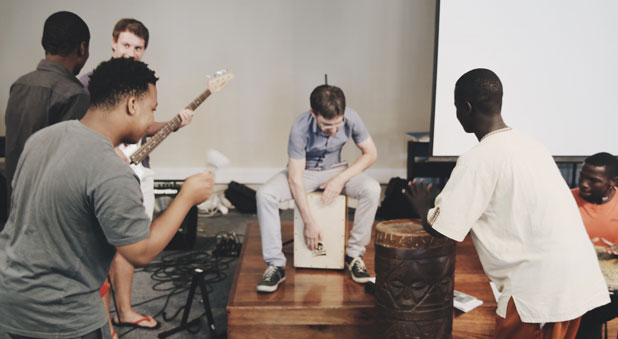An EMU music team recently took a trip to south Africa, visiting churches and colleges and leading workshop and training sessions on music ministry.
The trip, that kicked of in Durban in early February, saw team members Rob Smith, Greg Cooper, Alanna Glover, Andrew Massey, Ryan Miller and Philip Swadling host day conferences and a series of workshops in a variety of locations, helping musicians think clearly about musical worship and and how to most effectively edify congregations through it.
“We did a mixture of theology and practice,” says Mr Smith. “There was input from me from the theological end, for instance, and most workshops would start with some set of theological principles, but there was also a heavy amount of hands-on things as well. One of the workshops I ran was called ‘How to play guitar so people want to sing,’ and that tied into our overall message, which is that it’s a good thing to play in a way that serves the song, so that the song serves the singing of the people, and so that the people serve God in their singing.”
The tour also included workshops run at Cape Town Baptist Seminary and George Whitefield College, through whom the idea for the trip originally came. The team was also invited to lead the music at some local church services on their visit.
“Initially it came from connections between Christ Church St Ives and George Whitefield College, and then EMU were asked whether they wanted to have involvement,” says Mr Smith. “It basically evolved from there, and became more of an EMU venture, and one that took in George Whitefield but also other churches as well.”
While the majority of visits were to English speaking churches, in particular churches involved with the The Reformed Evangelical Anglican Church of South Africa (REACH), the team also spent time in Xhosa speaking churches and a local orphanage.
“We tended to spend most of our time whose way of doing church was most like ours,” says Mr Smith. “But we still had very worthwhile exchanges with others as well. The lady who ran the music at one of the Xhosa churches had plenty of questions. She came to one of the Saturday workshops, and had things she wanted our input on. She wanted to know should their choir move up the front, for instance. This church had unaccompanied music sung in Xhosa, with a choir seated amongst the congregation. It was quite amazing to be a part of. And I told her that what she was doing already worked brilliantly, that leading from within was fine, and unless there was a clear reason to change something, they shouldn't change just because they saw us do something different.”



























